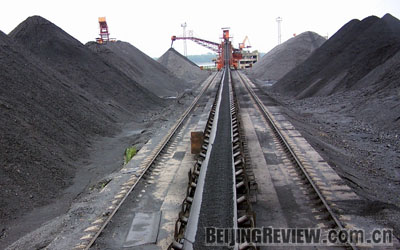| 
MOUNTAINS OF COAL: Rail transportation bottlenecks are one of the
factors hindering shipments and deliveries of thermal coal
For decades, coal has been seen as one of China's most reliable energy resources. Cheaper and more abundant than the country's oil and gas, coal has always been a reason for the government to feel secure about its energy resources. But in recent years this security has given way to nervousness as the country continues to suffer dire power shortages.
The booming Chinese economy, with its huge appetite for energy, has placed unprecedented pressure on its coal-fueled power generators. A flurry of China's provinces rationed electricity during the peak summer season this year, and some cities in developed coastal areas even experienced power blackouts. The brownouts and power cuts that periodically plunge the cities into darkness could provide an insight into what analysts describe as the country's worst power shortage in a decade.
The coal conundrum
The coal-fueled plants that generate four-fifths of China's electricity are failing to keep pace with the escalating demands of energy-thirsty industries that have chugged along at double-digit growth rates for years. According to the National Bureau of Statistics (NBS), the country's total power generation in June increased 8.3 percent year on year to 293.4 billion kwh. But of the total, coal-fueled power generation only grew a modest yearly 6.8 percent, hitting its lowest level since June 2007.
The State Grid, China's largest power transmission company, said in a statement that its power shortages this summer added up to 10 million kwh, mostly caused by a severe lack of thermal coal. The company also said the coal reserves it bought directly from coal plants had shrunk by 6.17 million tons by the end of May compared with the same period last year.
Worse still, the whole country is running out of thermal coal stockpiles. The State Electricity Regulatory Commission (SERC) said that at the end of May, the coal reserves of the country's thermal power plants that have a production capacity of more than 10,000 kw could only produce power for 11 days. This was less than the industry norm of 15 days, and some power plants would have to operate hand-to-mouth with no stockpiles at all, the SERC said.
But the problem cannot be blamed on insufficient coal production alone. According to the NBS, the country's annual coal output nearly doubled to 2.536 billion tons from 2005 to 2007. The total output in the first half of this year also surged by a yearly 11.1 percent to 1.239 billion tons.
Strained supplies
So what are the major factors working against the coal stockpiles? Dong Yan, a senior researcher at the National Development and Reform Commission (NDRC), said in a report that the biggest problem lies in logistics. Transport bottlenecks have been choking the country's thermal coal supplies, he said.
| 